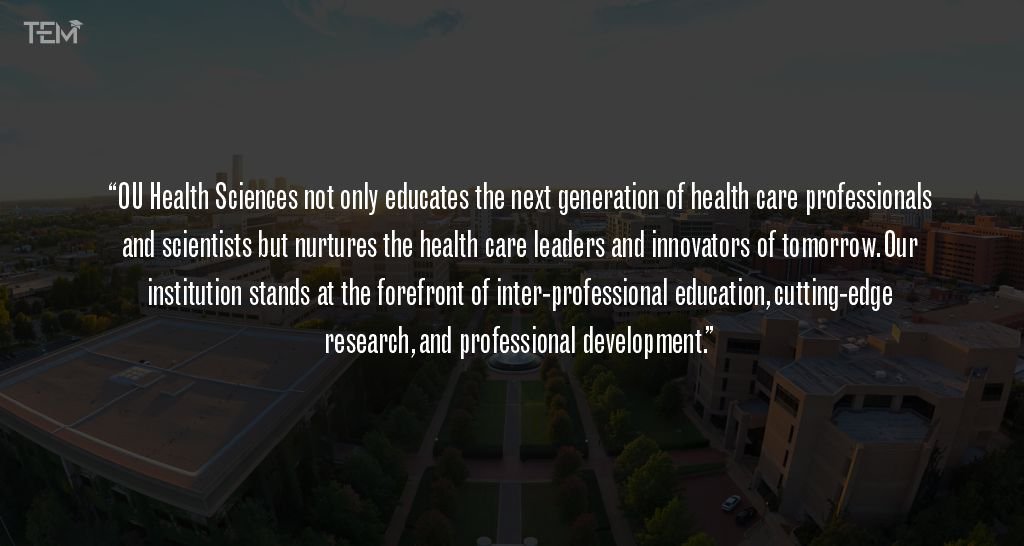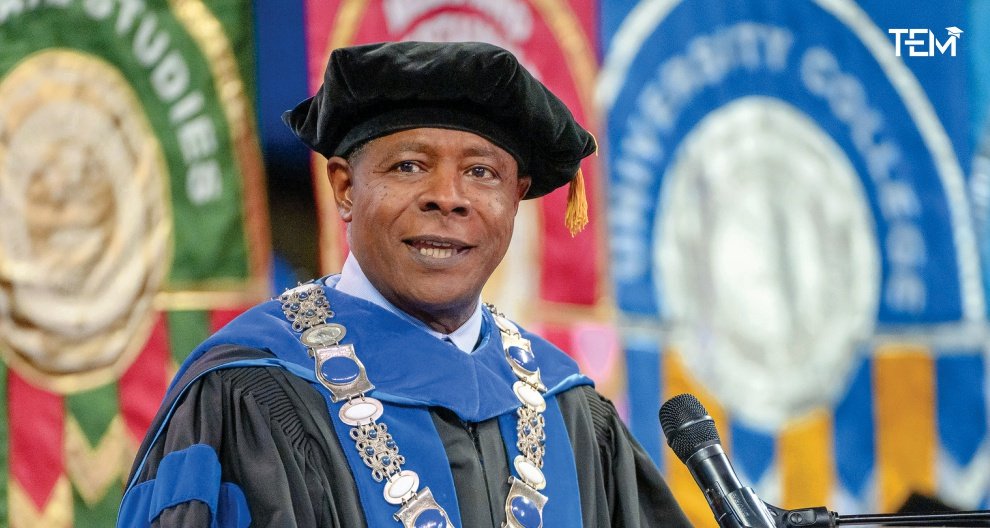Located in America’s heartland, the University of Oklahoma Health Sciences is one of the nation’s leading comprehensive academic health centers and a beacon of opportunity and innovation. Composed of eight health professional colleges – Allied Health, Dentistry, Medicine, Community Medicine, Nursing, Pharmacy, Public Health, and Graduate Studies – OU Health Sciences is dedicated to educating the next generation of health care professionals and health researchers.
With a tripartite mission comprising education, research, and patient care, OU Health Sciences educates over four thousand students, residents, and fellows daily on its campuses in Oklahoma City and Tulsa. This robust educational framework not only fortifies the state’s health care workforce but also propels groundbreaking research in critical areas of health and wellness.
In collaboration with the OU Health health care system, OU Health Sciences is home to clinical and research centers of excellence such as the OU Health Stephenson Cancer Center, the OU Health Harold Hamm Diabetes Center, and Dean McGee Eye Institute. With the largest portfolio of National Institutes of Health funding in Oklahoma, OU researchers showcase a steadfast commitment to advancing medical knowledge and finding cures for some of society’s greatest health challenges.
Academic Excellence and Versatility at OU Health Sciences
OU Health Sciences offers an extensive academic portfolio featuring more than 70 diverse degree programs, ranging from undergraduate to professional degrees at the master’s and doctoral levels, as well as graduate and post-doctoral degree programs. Students benefit from a dynamic curriculum that covers various health care disciplines, preparing them to excel in their chosen fields.
What sets the educational experience is the immersive learning that extends beyond traditional classrooms. Students and residents actively engage in comprehensive, hands-on clinical training at facilities throughout the state of Oklahoma, nationally, and even internationally. The variety of training locations and environments enriches students’ understanding and equips them to handle the complexities of their respective professions.
Pioneering Leadership, Academic Eminence, and Transformative Health Care Research
Gary E. Raskob, Ph.D., the senior vice president and provost at OU Health Sciences, oversees educational and research programs across the colleges, centers for excellence, and clinical and translational research. He serves on the boards of the OU Health System and the University Hospitals Authority and Trust, playing a key role in their governance structure.
Dr. Raskob holds academic appointments in the College of Public Health, where he previously served as dean, and the College of Medicine. He is also a Regents’ Professor of Epidemiology and Medicine. He has been with OU Health Sciences since 1991, demonstrating a long-term commitment to the institution and its academic mission.
Dr. Raskob’s research and scholarly focus include the prevention and treatment of deep-vein thrombosis and pulmonary embolism. His research efforts have extended into clinical trials and the development of antithrombotic drugs. His expertise includes evidence-based medicine and public health, with an emphasis on translating research evidence into practical applications.
Innovating Health Care: The Pillars of OU Health’s Future
OU Health Sciences is the leading health care research institution in Oklahoma and is home to the largest and most advanced biomedical infrastructure in the state. Pioneering research is conducted across its seven colleges and research centers for excellence, with a strategic focus on cancer, diabetes, neurosciences/vision, infectious diseases, and geroscience. These projects often adopt an interdisciplinary approach, uniting experts from diverse fields to pursue innovative discoveries aligned with shared objectives.
Research takes place in collaboration with global community partners and as an integral part of OU Health—Oklahoma’s premier academic health care system encompassing hospitals, clinics, and centers of excellence. Among the strategic centers are OU Health Stephenson Cancer Center, Oklahoma’s only National Cancer Institute-Designated Cancer Center; OU Health Harold Hamm Diabetes Center; the Oklahoma Center for Geroscience and Healthy Brain Aging; and the Oklahoma Center for Microbial Pathogenesis.
Researchers at OU Health Sciences, located both on the Oklahoma City and Tulsa campuses, are consistently well-funded. In fiscal year 2020, they set an institutional record, earning $190 million in sponsored funding. In fiscal year 2022, sponsored awards were nearly $180 million. OU Health Sciences is ranked 129 out of over 2,900 institutions in funding received from the National Institutes of Health, according to the Blue Ridge Institute for Medical Research. NIH funding is considered the key benchmark for research productivity and reputation on campus.
Vibrant Campus Life at the University
Located in the heart of downtown Oklahoma City, the OU Health Sciences Medical Center campus serves as a vibrant hub for education, research, and patient care. Boasting state-of-the-art facilities and cutting-edge technology, the campus stands at the forefront of academic excellence. The Robert M. Bird Library, with its expansive study areas and media resources, serves as the hub for all academic pursuits, while the multifaceted Student Union caters to various student needs, underscoring the institution’s commitment to a holistic student experience.
Beyond academics, students find a myriad of engagement opportunities, ranging from leadership positions and academic clubs to social activities and intramural sports. This dynamic and inclusive campus community enhances the overall student experience, promoting a well-rounded approach to education. The institution’s dedication to community outreach is evident in students actively participating in domestic and global projects and gaining practical insights into health care practices through hands-on experiences in clinics and community volunteering.
Moreover, the campus’s strategic location in the Oklahoma City metropolitan area adds another layer to the student experience. Oklahoma City, with a population of 1.2 million, offers diverse opportunities, including great educational resources, professional sports, a robust economy, a thriving arts scene, and a low cost of living.
Students in many OU Health Sciences programs have the unique opportunity to study on the OU-Tulsa campus. OU-Tulsa provides students with a strong sense of community and belonging while offering a number of amenities and services, including a bustling student recreation area, fitness center, student health clinic, as well as career and personal counseling. Tulsa is known for its small-town charm while having the most amenities of any major city. With a robust music scene and a variety of other attractions, there is something for everyone in Tulsa.
A Culture of Belonging
OU Health Sciences cultivates a thriving and inclusive community where all voices are heard and respected. This commitment extends to students, faculty, staff, alumni, and patients. The institution highly values diverse experiences, ensuring that every individual’s voice is acknowledged.
Beyond academics, OU Health Sciences fosters well-rounded individuals on every level. The university encourages emotional, intellectual, and personal growth, equipping students with the skills and confidence for successful health care careers. This journey includes professional development opportunities, paving the way for future leaders ready to serve their communities. Leadership and volunteer programs empower students to develop invaluable leadership skills and embrace a spirit of service and social responsibility.
OU Health Sciences takes pride in its vibrant and supportive campus environment, nurtured by its commitment to inclusivity and belonging. Recognized by the Student Government Association, these groups celebrate and advocate for the unique experiences of marginalized communities in Oklahoma, fostering a sense of belonging and enriching the campus with their perspectives. This results in an academically stimulating, socially engaging, and culturally diverse atmosphere where everyone feels valued and empowered to thrive.
Transformative Learning: Bridging Theory and Practice
OU Health Sciences is renowned for its ability to seamlessly translate theoretical knowledge into practical application within the health sciences field. This is achieved through a thriving interprofessional education environment, where over 4,000 students immerse themselves in collaborative learning. Events like the annual “Bridges to Access” conference exemplify this, bringing together diverse health care professionals to share current trends and challenges with students. This collaborative approach prepares graduates to excel as health care providers and scientists, equipped to meet the evolving needs of health care and public health.
Interprofessional education is a cornerstone of the university’s approach, spearheaded by the dedicated Interdisciplinary Learning Programs office. Here, students, faculty, and researchers from various health disciplines work together, mirroring real-world settings and fostering a holistic understanding of patient care and public health issues. Over 800 full-time faculty, 80 post-doctoral researchers, and nearly 800 residents and fellows contribute to this vibrant learning community.
Further enriching the experience, OU Health Sciences actively expands clinical rotations and experiential learning opportunities across all health and public health programs. The student-led Unity Clinic is a prime example, offering invaluable hands-on experience that prepares students for the complexities of 21st-century health care.
Innovation is also key. OU Health Sciences empowers faculty to develop and refine novel curricula and programs, including online options and certificates. This commitment to keeping pace with the evolving health care landscape equips students, residents, and post-doctoral fellows with cutting-edge knowledge and skills. In doing so, the university solidifies its position as a leading provider of continuing education, unique training opportunities, and professional development for the state’s scientists, researchers, and health professionals.
Unlocking Doors to Health Sciences Education: Tailored Admissions and Scholarly Opportunities
The OU Health Sciences offers a diverse array of degree programs across its seven professional colleges. Each college tailors its admission criteria to the specific requirements of its programs. For detailed information on their chosen field of study, prospective students are encouraged to visit the discover.ouhsc.edu website or reach out to the admissions offices of the respective colleges.
Furthermore, each college independently offers scholarship and financial aid opportunities crafted to support students in their academic pursuits, alleviating the financial challenges associated with pursuing higher education in the health sciences. Prospective students are urged to explore the wide range of scholarships and financial aid options available within their chosen college, adhering to the eligibility and application procedures provided.
Through the provision of tailored admissions criteria and diverse financial support opportunities, OU Health Sciences is dedicated to ensuring that quality education in the health sciences is accessible to a diverse and talented pool of students.
Quote



